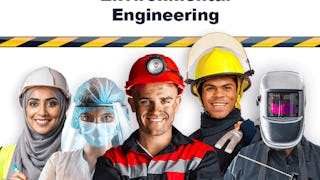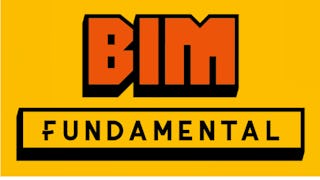- Browse
- Structural Engineering
Structural Engineering Courses
Structural engineering courses can help you learn load analysis, material properties, design principles, and construction methods. You can build skills in seismic design, structural dynamics, and the use of finite element analysis for modeling. Many courses introduce tools like AutoCAD for drafting, SAP2000 for structural analysis, and Revit for building information modeling, showing how these skills are applied in real projects to ensure safety and efficiency in construction.
Popular Structural Engineering Courses and Certifications
 Status: Free TrialFree TrialL
Status: Free TrialFree TrialLL&T EduTech
Skills you'll gain: Architectural Drawing, Blueprint Reading, Structural Engineering, Structural Analysis, Engineering Drawings, Building Design, Engineering Documentation, Architectural Engineering, Building Codes, Civil Engineering, Construction, Engineering Practices, Engineering Calculations
4.8·Rating, 4.8 out of 5 stars61 reviewsIntermediate · Course · 1 - 4 Weeks
 Status: Free TrialFree TrialD
Status: Free TrialFree TrialDDartmouth College
Skills you'll gain: Structural Analysis, Structural Engineering, Architectural Engineering, Building Design, Vibrations, Civil Engineering, Engineering, Construction, SketchUp (3D Modeling Software), Mechanics, Engineering Analysis, Engineering Calculations, Mathematical Modeling, Engineering Design Process, Design, Simulation and Simulation Software, Experimentation, Materials science, 3D Modeling
4.8·Rating, 4.8 out of 5 stars174 reviewsBeginner · Specialization · 3 - 6 Months
 Status: Free TrialFree TrialL
Status: Free TrialFree TrialLL&T EduTech
Skills you'll gain: Construction Inspection, Structural Analysis, Structural Engineering, Building Design, Construction, Building Codes, Architectural Drawing, Industrial Design, Commercial Construction, Architectural Engineering, Engineering Drawings, Civil Engineering, Computer-Aided Design, Failure Analysis, Technical Drawing, Engineering Analysis, Engineering Calculations, Engineering Design Process, Engineering Software, Sustainable Engineering
4.9·Rating, 4.9 out of 5 stars43 reviewsAdvanced · Specialization · 3 - 6 Months
 Status: Free TrialFree Trial
Status: Free TrialFree TrialSkills you'll gain: Prompt Engineering, Prompt Patterns, ChatGPT, Generative AI, AI Workflows, Context Management, Decision Making
4.8·Rating, 4.8 out of 5 stars7.7K reviewsBeginner · Course · 1 - 4 Weeks
 Status: NewNewStatus: Free TrialFree TrialK
Status: NewNewStatus: Free TrialFree TrialKKhalifa University
Skills you'll gain: Environmental Management Systems, Environment Health And Safety, Environmental Monitoring, Accident Reporting, Safety Training, Fire And Life Safety, Accident Prevention, Hazardous Waste Operations And Emergency Response Standard (HAZWOPER), Environmental Regulations, Occupational Health, Environmental Engineering, Environmental Laws, Environmental Resource Management, Risk Management, Risk Management Framework, Environmental Engineering and Restoration, Risk Analysis, Environment and Resource Management, Engineering Management, Engineering
4.8·Rating, 4.8 out of 5 stars173 reviewsBeginner · Specialization · 1 - 3 Months
 Status: PreviewPreviewN
Status: PreviewPreviewNNational Taiwan University
Skills you'll gain: Building Information Modeling, Data Modeling, 3D Modeling, Computer-Aided Design, Construction, Engineering Practices, Construction Management, Civil Engineering, Mechanical Engineering
4.7·Rating, 4.7 out of 5 stars2K reviewsBeginner · Course · 1 - 3 Months
What brings you to Coursera today?
 Status: Free TrialFree TrialC
Status: Free TrialFree TrialCColumbia University
Skills you'll gain: Project Schedules, Construction Management, Construction Estimating, Project Finance, Cost Estimation, Punch Work, Construction, Project Risk Management, Bidding, Building Information Modeling, Scheduling, Cost Control, Environment Health And Safety, Project Closure, Lean Methodologies, Timelines, Real Estate, Finance, Business Transformation, Innovation
4.7·Rating, 4.7 out of 5 stars9.6K reviewsBeginner · Specialization · 3 - 6 Months
 Status: Free TrialFree Trial
Status: Free TrialFree TrialSkills you'll gain: Architectural Drawing, Structural Engineering, Building Design, Structural Analysis, Civil and Architectural Engineering, Building Codes, Engineering Software, Engineering Calculations, Engineering Analysis
4.7·Rating, 4.7 out of 5 stars22 reviewsIntermediate · Course · 1 - 4 Weeks
 Status: Free TrialFree TrialL
Status: Free TrialFree TrialLL&T EduTech
Skills you'll gain: Architectural Drawing, Blueprint Reading, Structural Engineering, Structural Analysis, Building Design, Engineering Drawings, Engineering Documentation, Architectural Engineering, Civil and Architectural Engineering, Building Codes, Construction Estimating, Civil Engineering, Engineering Practices, Construction, Construction Engineering, Engineering Calculations, Engineering Software, Engineering Analysis
4.7·Rating, 4.7 out of 5 stars89 reviewsAdvanced · Specialization · 1 - 3 Months
 Status: NewNewStatus: Free TrialFree TrialB
Status: NewNewStatus: Free TrialFree TrialBBirla Institute of Technology & Science, Pilani
Skills you'll gain: Data Analysis, Computational Logic, Engineering Calculations, Trigonometry, Linear Algebra, Engineering Analysis, Logical Reasoning, Deductive Reasoning, Probability & Statistics, Statistical Analysis, Calculus, Analytical Skills, Bayesian Statistics, Differential Equations, Programming Principles, Statistical Inference, Theoretical Computer Science, Numerical Analysis, Descriptive Analytics, Applied Mathematics
4.6·Rating, 4.6 out of 5 stars191 reviewsBeginner · Specialization · 3 - 6 Months
 Status: Free TrialFree TrialL
Status: Free TrialFree TrialLL&T EduTech
Skills you'll gain: Autodesk Revit, Building Information Modeling, Architectural Engineering, Drafting and Engineering Design, Computer-Aided Design, Engineering Documentation, Architectural Design, 3D Modeling, Facility Management, Civil Engineering, Structural Engineering, Technical Standard, HVAC, Electrical Systems, Plumbing, User Interface (UI)
4.5·Rating, 4.5 out of 5 stars107 reviewsIntermediate · Course · 1 - 3 Months
 Status: PreviewPreviewG
Status: PreviewPreviewGGeorgia Institute of Technology
Skills you'll gain: Engineering Analysis, Mechanics, Torque (Physics), Engineering Calculations, Mechanical Engineering, Engineering, Civil Engineering, Structural Analysis, Applied Mathematics, Trigonometry
4.8·Rating, 4.8 out of 5 stars5.1K reviewsMixed · Course · 1 - 3 Months
What brings you to Coursera today?
In summary, here are 10 of our most popular structural engineering courses
- Design Basics of RCC Buildings: L&T EduTech
- The Engineering of Structures Around Us: Dartmouth College
- Steel Multi Storey Building - System Design: L&T EduTech
- Generative AI: Prompt Engineering Basics: IBM
- Health, Safety, and Environmental (HSE) Engineering: Khalifa University
- BIM Fundamentals for Engineers: National Taiwan University
- Construction Management: Columbia University
- Structural scheme setting and ETABS Analysis of RCC Building: L&T EduTech
- Concrete Multi Storey Building - System Design: L&T EduTech
- Mathematics for Engineering: Birla Institute of Technology & Science, Pilani
Frequently Asked Questions about Structural Engineering
Structural engineering is a specialized field within civil engineering that focuses on the design and analysis of structures such as buildings, bridges, and towers. It plays a crucial role in ensuring that these structures can withstand various forces and loads, such as gravity, wind, and earthquakes. The importance of structural engineering lies in its ability to create safe, functional, and sustainable environments for people to live and work in. By applying principles of physics and materials science, structural engineers contribute to the integrity and longevity of infrastructure, making it essential for urban development and public safety.
A career in structural engineering can lead to various job opportunities across different sectors. Common roles include structural engineer, project manager, design engineer, and construction manager. Structural engineers often work for engineering firms, construction companies, or government agencies. They may also specialize in areas such as seismic design, bridge engineering, or forensic engineering. With experience, professionals can advance to senior positions, lead teams, or even start their own consulting firms, making structural engineering a versatile and rewarding career path.
To succeed in structural engineering, several key skills are essential. First, a strong foundation in mathematics and physics is crucial for understanding the principles of load distribution and material properties. Proficiency in computer-aided design (CAD) software is also important for creating detailed plans and models. Additionally, problem-solving skills, attention to detail, and effective communication are vital for collaborating with architects, contractors, and clients. Familiarity with building codes and regulations is necessary to ensure compliance and safety in designs.
There are numerous online courses available for those interested in structural engineering. Some of the best options include specialized programs that cover topics like structural analysis, materials science, and design principles. Look for courses offered by reputable institutions that provide practical insights and real-world applications. For instance, you might explore the AI Engineering Specialization to understand how artificial intelligence can enhance engineering processes. These courses often include hands-on projects and assessments to reinforce learning.
Yes. You can start learning structural engineering on Coursera for free in two ways:
- Preview the first module of many structural engineering courses at no cost. This includes video lessons, readings, graded assignments, and Coursera Coach (where available).
- Start a 7-day free trial for Specializations or Coursera Plus. This gives you full access to all course content across eligible programs within the timeframe of your trial.
If you want to keep learning, earn a certificate in structural engineering, or unlock full course access after the preview or trial, you can upgrade or apply for financial aid.
Learning structural engineering can be approached through a combination of online courses, textbooks, and practical experience. Start by enrolling in introductory courses that cover the basics of structural analysis and design. Supplement your learning with textbooks that provide in-depth knowledge and case studies. Additionally, gaining hands-on experience through internships or co-op programs can be invaluable. Engaging with professional organizations and attending workshops can also enhance your understanding and network within the field.
Typical topics covered in structural engineering courses include structural analysis, material mechanics, design principles, and construction methods. Students may also learn about specific structures like bridges and buildings, as well as advanced topics such as earthquake engineering and sustainable design practices. Courses often incorporate software training for tools like AutoCAD and structural analysis programs, providing practical skills that are directly applicable in the field.
For training and upskilling employees in structural engineering, look for courses that focus on practical applications and industry standards. Programs that offer project-based learning and real-world case studies can be particularly beneficial. Consider options that cover emerging technologies in engineering, such as the IBM AI Engineering Professional Certificate, which can help professionals integrate AI into their structural engineering practices. These courses can enhance skills and keep teams updated with the latest industry trends.










